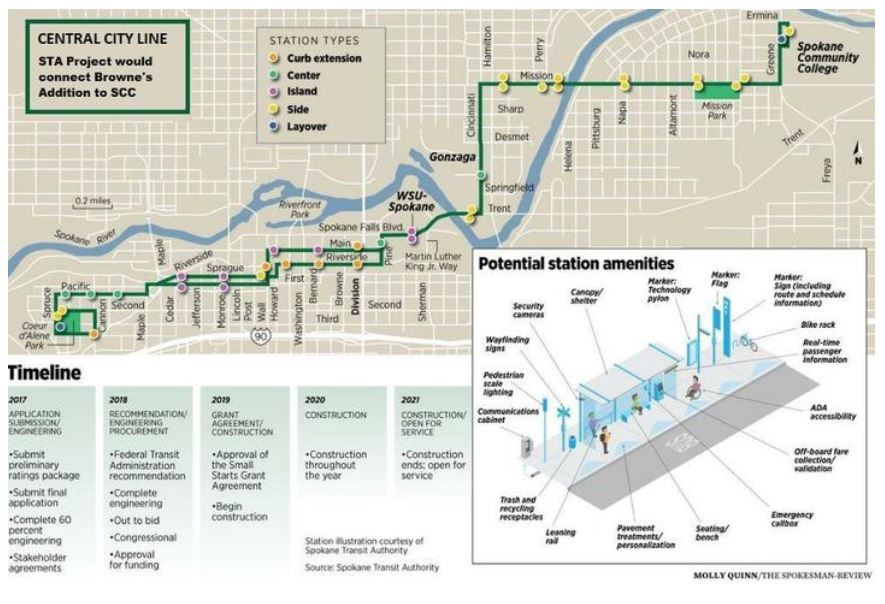Getting There: Cuts to federal grant funding could jeopardize future of Central City Line
Tuesday, February 27, 2018

(As reported in The Spokesman Review by Nick Deshais)
The sleek Central City Line is supposed to signal the future of Spokane transit.
Electric and quiet. No waiting in line while the folks ahead slip quarters into the driver’s change kiosk. A long, snaky bus that looks like a streetcar, raining down $175 million in economic impact over 20 years.
But now, three-quarters of the $72 million needed to build the line is under threat by Washington, D.C.
Funding for the marquee project by the Spokane Transit Authority connecting Browne’s Addition to Spokane Community College could be eliminated under the Trump administration’s recent budget proposal.
Though STA officials have been largely quiet on the matter, notes for an upcoming meeting show that officials at the transit agency will talk about the proposed cut to the grant program STA is relying on to fund the Central City Line.
The project, a 6-mile-long route running through downtown and the University District, is billed as bus rapid transit, an affordable rubber-tired alternative to a fixed-route streetcar system that still provides some of the amenities and benefits of the latter. STA estimates the line will provide a million rides a year.
Still, the line will not contain some key components of a BRT, or bus rapid transit, system, such as a dedicated lane for the bus and priority at traffic signals, both of which would help ensure the line is not affected by traffic delays.
The line is funded with $15 million in Connecting Washington funds, which are raised through a gas tax. Another $3.5 million comes from state and federal funds already awarded to the project.
But for years, STA officials have said the project relies on $54 million in grants they anticipated getting from the federal government. That represents 75 percent of what’s needed to build the line, money that would come from the federal Small Starts Grant program.
In fiscal year 2017, which began October 2016, the federal government provided $2.4 billion to the Capital Improvement Grants Program, the primary grant program of the U.S. Department of Transportation’s Federal Transit Administration that funds the Small Starts grant program, as well as the more arduous New Starts and Core Capacity projects.
Under Trump’s proposal, which was released this month, the government would cut that program’s funding in half, to $1.2 billion.
The budget proposal is separate from Trump’s infrastructure plan, which would put $200 billion in federal money toward fixing the nation’s roads and bridges.
As the STA notes suggest, it is unclear how the budget wrangling will affect the local bus line, and the White House’s proposal is just the beginning of budget negotiations with Congress.
The House Appropriations Committee has recommended $182 million for Small Starts, and the Senate Appropriations Committee has recommended $318 million.
“There has been no action to reconcile the differences while Congress still funds the federal government on continuing resolutions,” the notes read.
Currently, 26 projects with good ratings have requested Small Starts funding, with an average request of $57 million.
According to a report in the Seattle Times, eight transit projects in Washington anticipating more than $2 billion in grant funding would lose funding under Trump’s plan, including light rail, streetcar and bus line projects, mainly on the West Side. The biggest of them is Sound Transit’s Lynnwood Link, a 9-mile light rail line between Seattle and Lynnwood that seeks $1.2 billion in New Starts grant funding.
While the loss of the Central City Line would be a huge blow to STA, which has spent years designing and promoting the project, the agency has issued statements saying it wants to see how things shape up.
“We look forward to working with the White House, U.S. Department of Transportation, and our Congressional delegation to invest further in rebuilding our country’s infrastructure,” Brandon Rapez-Betty, a spokesman, said in a statement. “The President’s (budget) is the start of a conversation with Congress to effectively and efficiently appropriate transit funds and we will be working hard to ensure Spokane Transit Authority’s interests and our region’s priorities are thoughtfully considered.”
In other news
An idea that originated in Spokane to encourage development on parking lots died in Olympia this week.
The idea – to offer developers a 10-year break from taxes for any project they build on what is now a surface parking lot – passed in the Senate by a 35-12 vote early this month.
Before it passed, Sen. Maralyn Chase, D-Shoreline, put a rider in the bill requiring contractors of any development to pay the “prevailing rate of wage” as defined by state law. Backers of the bill worried the new language would discourage any development and pulled the bill before it went far in the House.
The bill was co-sponsored by Sens. Andy Billig and Michael Baumgartner, a Democrat and Republican of Spokane, respectively. It also gained the sponsorship of Sen. Steve Conway, D-Tacoma, Sen. Jeannie Darnielle, D-Tacoma, and Sen. Shelly Short, R-Addy.
Around town
With winter still in full frozen effect, the twinkle of roadwork can be seen, and road obstructions are beginning.
Construction on a combined sewer overflow just to the east of T.J. Meenach Drive, below Northwest Boulevard, will close the northbound right lane of T.J. Meenach Drive between Pettet Drive and Northwest Boulevard from Feb. 27 to March 2. Grace Avenue from Alberta to Cochran streets remains closed. The $8 million project will build a 1.4-million gallon tank.
Crews working on the pedestrian bridge in the University District will close Martin Luther King Jr. Way on March 1 and 2.